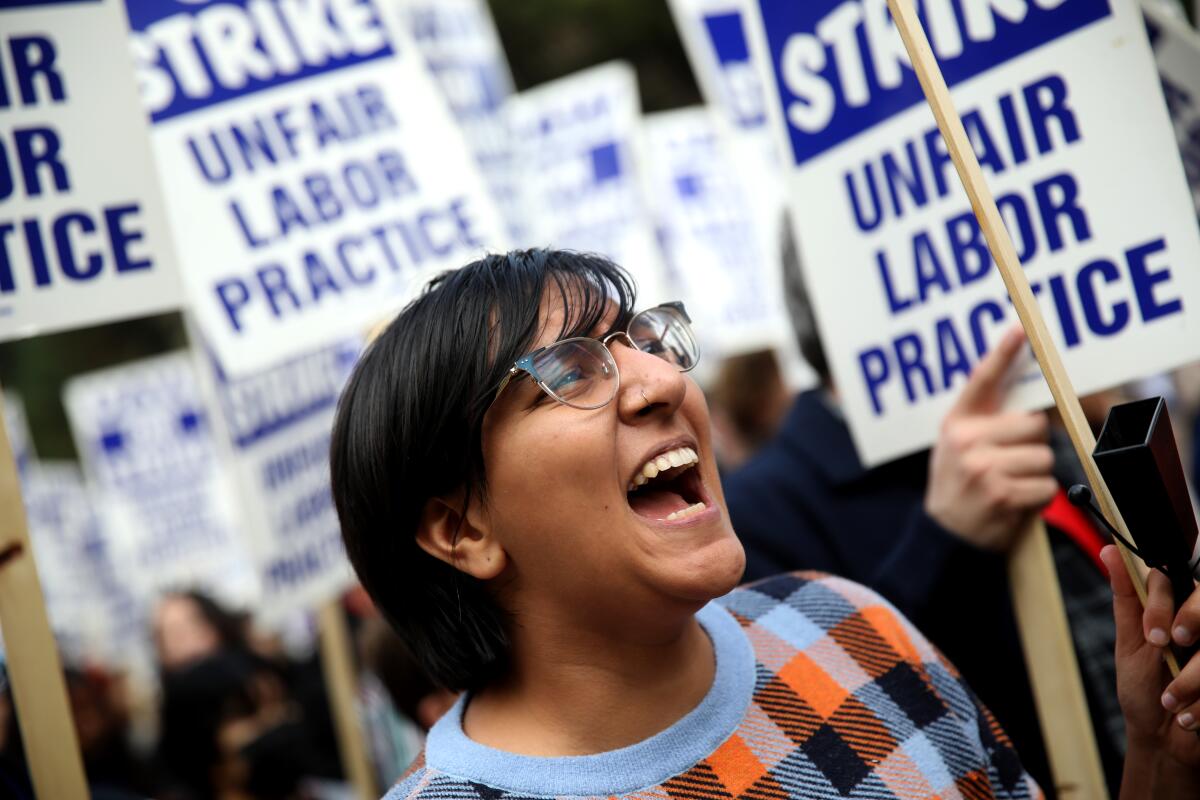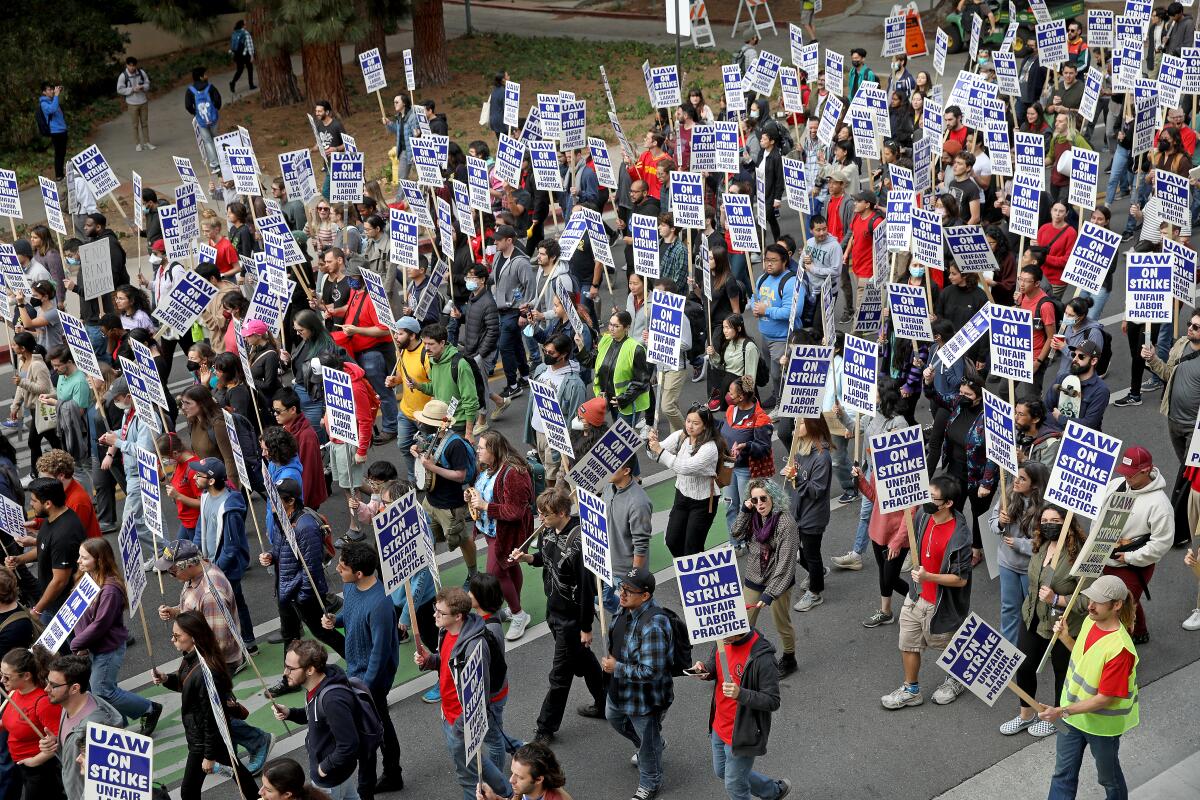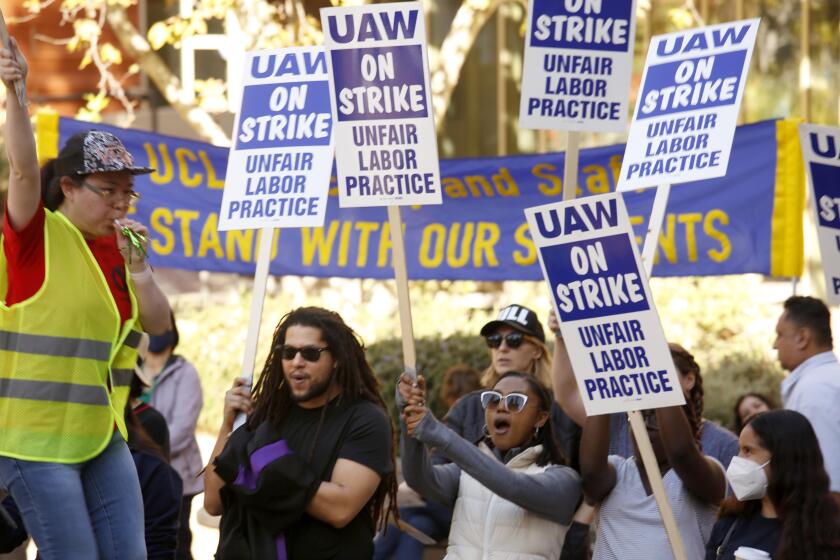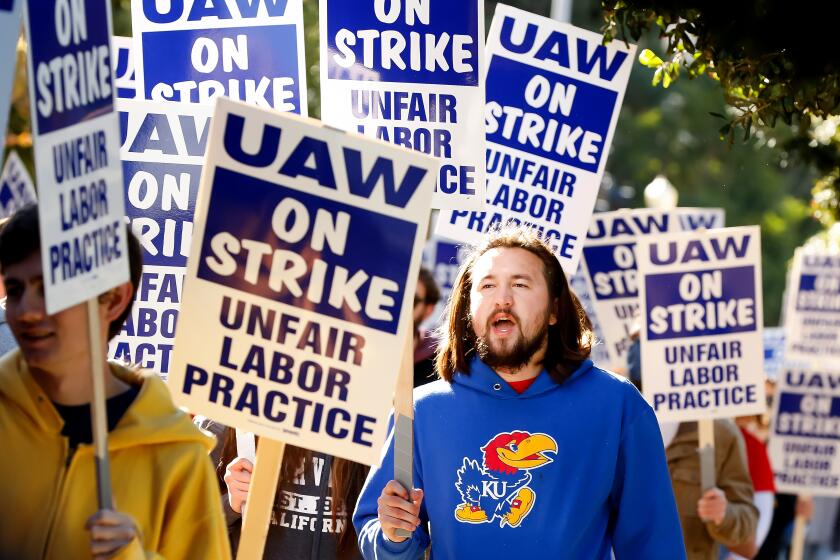Chaos over grades, finals and ongoing classes erupts as UC strike continues

UCLA junior Sania Tuli is worried that sheâs missing material sheâll need when she takes her medical college admission exam next year. UC Riverside senior Nathalie Boutros fears she is falling behind in a class required to graduate because she hasnât been able to find help during the massive strike of 48,000 University of California academic workers.
And professor Dylan Rodriguez has stopped teaching his UC Riverside class to support strikers. But his UC Berkeley colleague Kristie Boering has made the opposite decision to serve her students.
The nationâs largest ever strike of higher-education academic workers â teaching assistants, tutors, graduate student researchers and postdoctoral scholars â entered its third week Monday, triggering growing anxiety and uncertainty over how to handle the most critical work at the end of fall term: final papers, projects and exams. The UC employees, represented by four United Auto Workers bargaining units, lead discussion sessions, run labs, grade assignments, administer exams, conduct research and perform other critical roles that give UC its national reputation for excellence.
âPeople are losing their minds,â said Kip Fulbeck, a UC Santa Barbara art professor who said the strike has touched off the most tumult heâs seen during his three decades at the campus other than the pandemic. âFaculty are caught between trying to serve their students but also respect the strikers. Students are caught between trying to complete their work but also support the graduate students. No one seems to know whatâs going on.â
The union is demanding significant pay increases to help workers afford housing in the high-cost areas where most UC campuses are located, along with more support for child care, healthcare, transportation and international students. UCâs offers donât come close to meeting union demands, but officials say they have been âfair, reasonable and responsive to the unionâs priorities.â
Students across the system say they support the strike â UC Student Assn. presidents at all nine undergraduate campuses have endorsed it. But they also admit to worries about the effect on learning as classes are canceled, labs suspended and assignments left ungraded. Many say they are caught between professors who are too busy to answer all student questions and teaching assistants who donât respond.
The strike of 48,000 University of California workers may have long-lasting consequences to the systemâs teaching and research excellence, some fear.
UCLA first-year student Alex Antenen said she supports the union but feels she is âmissing out on a lot.â She studied hard for a test and presentation involving computer coding that was scheduled for Monday and would have made up 15% of her final grade. But it was canceled because no teaching assistant was available to proctor. She is also struggling to understand challenging material.
âThe lectures are pretty complex,â Antenen said. âItâs at a pretty high level. And so, when we go to discussion, we can kind of work on those topics more and ask questions with the TA. Not having that is really difficult.â
The strike, spanning all 10 UC campuses and the Lawrence Berkeley National Laboratory, has also triggered tensions among faculty systemwide over whether to withhold their labor in solidarity with strikers or scramble to fill the void to support their students.
More than 300 faculty members announced Monday they would not cross picket lines, showing support for the strikers by not teaching classes or submitting grades until the strike ends. The growing list includes such high-profile faculty as social activist Angela Davis at UC Santa Cruz, philosopher Judith Butler at UC Berkeley and historian Robin Kelley at UCLA.
âAs long as this strike lasts, faculty across the system will be exercising their right to honor the picket line by refusing to conduct university labor up to and including submission of grades â labor that would not be possible without the labor of all other academic workers as well as university staff,â the faculty said in a statement. âWe do this toward bettering the working and learning conditions of all students present and future.â

Rodriguez, the UC Riverside professor, has stopped teaching his media and cultural studies classes in solidarity with strikers â and said students in his graduate seminar and upper-division course are also honoring the picket line. He discussed the strike with his students and said they related to the workersâ struggles to pay for housing, food and child care. Most of his undergraduate students in his course on race and police violence have turned the strike into research projects by videotaping interviews with picketing workers, he said.
Rodriguez said many faculty are being pressured by their department chairs and deans to take up the work that strikers are not performing. But he said doing so would set a âhorrific precedentâ of devaluing teaching assistants and graduate student researchers who are UCâs future professors and research stars.
At UC Berkeley, however, chemistry professor Boering is continuing to teach, including an introductory chemistry class of nearly 1,500 students. She said many of them are aspiring engineers and medical professionals who need to master the introductory class content to advance. Boering spends several extra hours daily juggling the class with a team teacher to offer extended office hours, discussion sections, response to student emails and other tasks.
âIâm very committed to my students,â Boering said. âIâm just not going to sacrifice their knowledge when I can give it to them.â
About 48,000 academic workers across the University of California system remain on strike asking for better pay, childcare support and commuting subsidies.
She and her husband, fellow chemistry professor Ronald Cohen, said that many professors in science, technology, engineering and math have a different view of the strike. Graduate student researchers tend to make considerably more than the $24,000 the union says is the average pay of striking workers. At UC Berkeley, STEM workers earn between $38,000 and $43,000 annually for half-time work, which benefits their own doctoral programs, Cohen said.
The couple did not sign the faculty statement committing to the strike and Cohen said many of their colleagues, particularly in STEM fields, were âangry and opposedâ to it. Many are disillusioned with both the union and UC systemwide leaders, Cohen said.
At UCLA, signs of the strike were visible across campus Monday, as a raucous roving demonstration of several hundred picketers carried signs and chanted as they moved from one junction to another.
Henry, a first-year student who declined to give his last name, said it has been a tough slog through multivariable calculus and chemistry without teaching assistants to help explain the difficult concepts. In calculus, a review session before the midterm was canceled; several students believed that action had hurt them with lower exam scores, he said.
Concepts in his chemistry class â molecular orbitals â were tough to grasp just reading a textbook without a teaching assistant, he added.
âNext week is finals week,â he said. âI think a lot of my peers are feeling pretty shaky.â
Tuli, a premedical student, is torn by the strike. She supports her teaching assistants, yet worries about her medical school exams next summer. Her physics professor canceled a week of classes, but then resumed them on Zoom as the strike wore on â not enough to learn the material, she said. Her genetics class requires a presentation on a book with a group every two weeks, but they are no longer happening. Her group projects arenât going well because some members have stopped participating since the strike started.
âItâs kind of put me in a sort of a moral dilemma because I stand in solidarity with the TAs,â Tuli said. But, she added, âItâs gone on for like a little too long ... and it just seems like the interests of the students have kind of taken a back seat.â
Alex Niles, UC Student Assn. president, said such experiences are frustrating for undergraduates. âBut it is the UCâs fault,â he said. âThe UC can end the strike when they want by paying a basic living wage ⌠they had months and months to do this.â
At UC Riverside, Boutros said one of her professors canceled class to protest and give students the option of participating in the demonstrations. Another moved classes to Zoom but made attendance optional.
But the fourth-year student is most worried about her class on law and society, which she needs to pass to graduate on time. Attendance in that class is still required but Boutros is worried about falling behind without the help of a teaching assistant. Work she submitted earlier in the quarter has not yet been graded, so she is not sure where she stands as the quarter nears its end. She plans on watching YouTube videos and researching law cases on her own to better understand the material as she prepares for the course final.
âItâs anxiety inducing, Iâm not going to lie,â she said. âAs much as I want to support them in getting the representation that they need, I also want to be able to graduate.â
More to Read
Sign up for Essential California
The most important California stories and recommendations in your inbox every morning.
You may occasionally receive promotional content from the Los Angeles Times.















